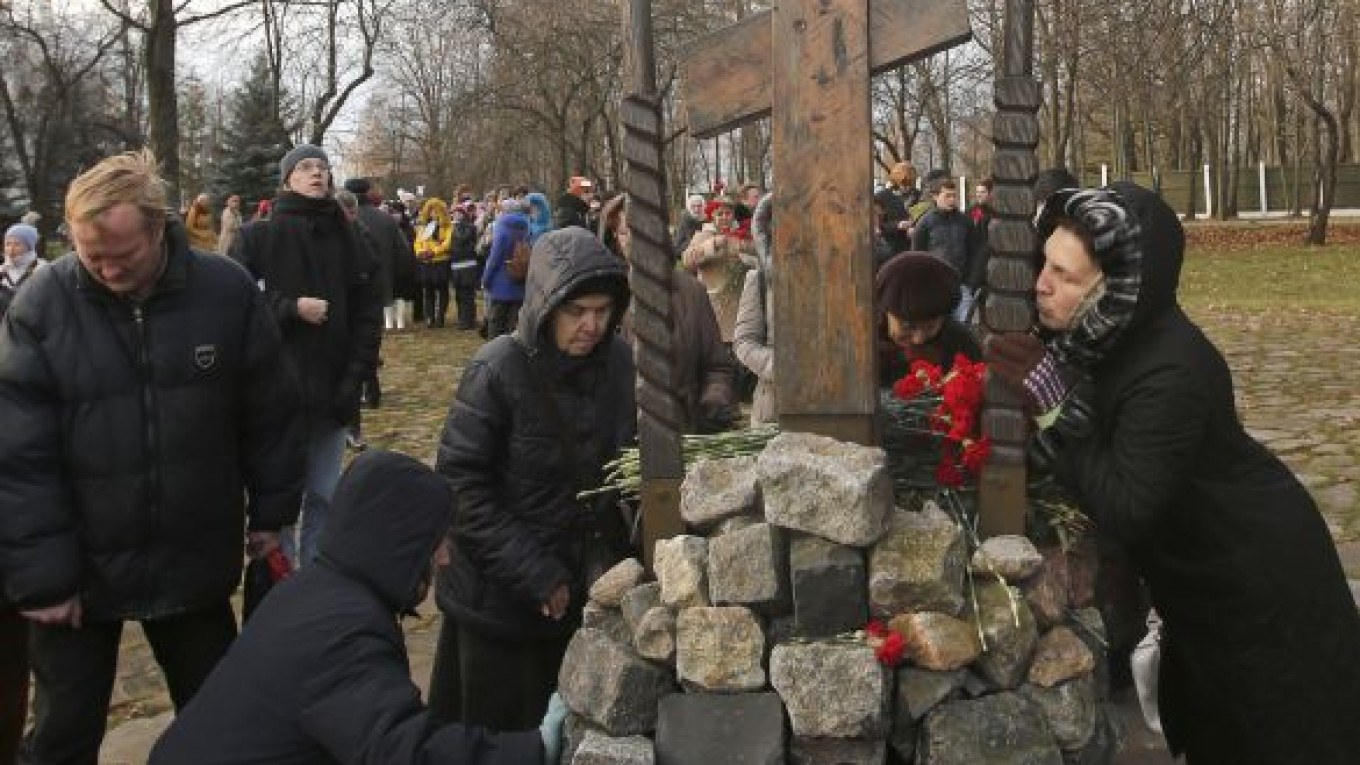More than 500 people gathered on downtown Moscow's New Pushkin Square on Tuesday, the official "Day of Remembrance of the Victims of Political Repressions," to protest what presenters dubbed the continuation of political repression in the country.
The "Stop 1937" rally, whose name referred to a particularly bloody year during the purges that took place under the rule of Josef Stalin, was partially organized by the Memorial human rights group to "recall the victims of past political repressions as well as to demand a stop to political persecution and to release new political prisoners," the group said in a statement.
A day earlier people with candles and flowers in their hands lined up from 10 a.m. to 10 p.m. outside the former KGB headquarters on Lubyanskaya Ploshchad to read a list of names of 30,000 victims shot in Moscow because their political views contradicted those of the official regime.
"Boris Yakovlevich Lifshits, 40, editor at the Zarya Vostoka [Star of the East] publishing house, shot on March 10, 1937. Simon Makarovich Morev, 34, senior watchmaker, shot on Feb. 17, 1938. Alexander Dmitriyevich Sakharov, 62, clergyman, shot on Dec. 3, 1937. Lest we forget," a plaque outside the building reads.
At the New Pushkin Square rally, presenters spoke out against the criminal cases from the May 6 opposition rally, the accusations stemming from the "Anatomy of a Protest 2" television exposé, and the jailing of Pussy Riot members.
"Unfortunately, the number of political prisoners is likely to grow as authorities are preparing new mechanisms that permit political repressions," said Oleg Orlov, a member of Memorial.
"There used to be two such methods: falsification of cases, such as Taisia Osipova's case with planting drugs on her, and the use of repressive anti-extremist legislation against a broad number of opposition activists," he said. "During the last several months, these mechanisms have been validated with new repressive laws."
Orlov asserted that although current authorities don't intend to resemble those of Stalin's time, a core similarity is evident. "This similarity rests in the fact that authorities are trying to keep power by any means. In such a situation, interaction with society can be based on the only possible method: repression," he said.
But Pavel Salin, an analyst at the Center for Current Politics, said by phone that it was erroneous to compare the current situation with Stalin's system because there is "no repression now, only pressure on the opposition."
"Human rights organizations are trying to play on public opinion formed by Western society," he said. He did not exclude that arrests of opposition activists could continue. "The state has chosen a means of pressure, and it won't back out of that," he said.
Memorial director Alexander Cherkasov lambasted a raft of recently passed bills on slander, NGO treatment and espionage, which he believed to be enabling repression. "Instead of guaranteeing rights, they create a fundament for repression. A land without freedom is being created. Thousands of people are being repressed."
Related articles:
A Message from The Moscow Times:
Dear readers,
We are facing unprecedented challenges. Russia's Prosecutor General's Office has designated The Moscow Times as an "undesirable" organization, criminalizing our work and putting our staff at risk of prosecution. This follows our earlier unjust labeling as a "foreign agent."
These actions are direct attempts to silence independent journalism in Russia. The authorities claim our work "discredits the decisions of the Russian leadership." We see things differently: we strive to provide accurate, unbiased reporting on Russia.
We, the journalists of The Moscow Times, refuse to be silenced. But to continue our work, we need your help.
Your support, no matter how small, makes a world of difference. If you can, please support us monthly starting from just $2. It's quick to set up, and every contribution makes a significant impact.
By supporting The Moscow Times, you're defending open, independent journalism in the face of repression. Thank you for standing with us.
Remind me later.


